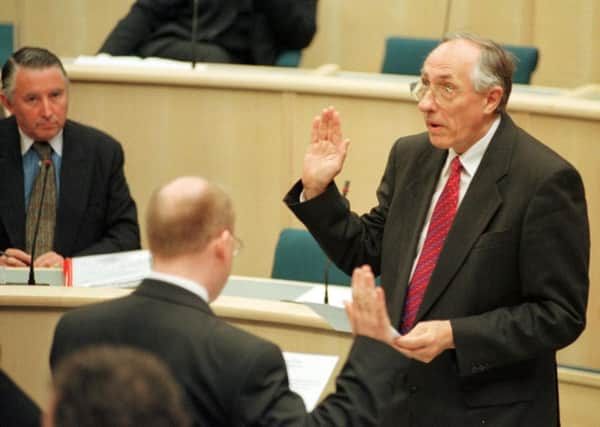Devin Scobie: Holyrood still has some growing up to do
This article contains affiliate links. We may earn a small commission on items purchased through this article, but that does not affect our editorial judgement.


Although Dewar is widely regarded as the architect of Scottish devolution, his task that morning – ably assisted by me as a humble PR manager – was nothing more grand than pulling a Saltire off a plaque which was mounted on a rock the size of a tombstone to open a new sausage factory.
Dewar was known for many things, but humour and polite banter were not amongst them. I had met him a few times before and had warned many an enthusiastic client not to dwell on small talk or, heaven forbid, linger a moment longer than absolutely necessary on “PR-style photos”. But today was different. It was a mild day in September and Dewar’s popularity was as high as it would ever go.
Advertisement
Hide AdAdvertisement
Hide Ad• READ MORE: Donald Dewar: Scottish Parliament’s founding father
He had, after all, delivered an overwhelming Yes vote in the two-question referendum that would see the Scottish Parliament reconvene less than two years later. That was then, of course, and Donald Dewar would sadly be taken from us barely 18 months into the life of the young Parliament, in October 2000. I wonder what he would have made of it all, 20 years on from that referendum result, and how business has chosen to interact with it.
There were business lobbyists, of course, back in 1997, albeit focused on the then rather distant world of Westminster, where all the real decisions were being taken.
We had to work hard to overcome scepticism within the corporate world that Holyrood would a) matter and b) be competent enough to make any grown-up decisions.
Many were in the “if it ain’t broke, don’t fix it” camp and shared the view, highlighted recently by former Scottish Labour leader Wendy Alexander, that many Whitehall departments were highly sceptical of whether it made sense to devolve back to Scotland areas that they had hitherto been in charge of and, to their minds, were running rather efficiently.
Even amongst our clients, there was no shortage of scepticism about whether matters beyond those of housing, health and education should even be allowed to come to Scotland.
But come to Scotland they did, and the Scottish business community has now come to respect – perhaps even like – working with the 129 parliamentarians who now control more than 85 per cent of the levers of policy which can impact on their day jobs.
Advertisement
Hide AdAdvertisement
Hide AdIn the early days, MSP engagement was more leisurely and a dinner with eight to ten elected members was a relatively normal way to get the business done (on both sides). But as policy responsibilities grew, time demands are now at the point where even a quick coffee has to be negotiated sometimes weeks in advance.
Written briefings got shorter and the reach and purview of Holyrood committees wider. A dozen cross-party groups in the first parliament has grown, like Topsy, to nearly 100 now. That’s one for every MSP, once you disregard ministers who would not normally participate. Maybe Donald Dewar would see this all as progress; a parliament which this year turned 18 and came of age. But, like every 18-year-old, it still has a lot more growing up to do.
Engagement with the Scottish Parliament is now more important than ever for anyone doing business in Scotland. The key with increasingly time-pressed politicians is catching their attention. So reach out to your constituency MSP with an initial email, and if that doesn’t get a response, try an old-fashioned letter. Keep it local and don’t forget about your councillors – many of whom could be MSPs of the future.
The more local, constituency-focused or tying in with committee or spokesperson responsibilities, the better.
• Devin Scobie is public affairs director with Perceptive Communicators and a former councillor and parliamentary candidate